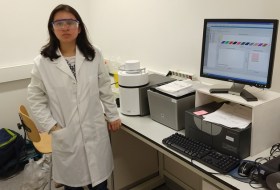News
Unicauca’s student conducts research stay in Spain on DNA replication process
The student of the Environmental Engineering program and member of the GCISA research group, Ángela Sofía Gómez López, acquired theoretical and practical knowledge in the molecular biology technique to artificially reproduce the process of DNA replication.
Ángela Sofía Gómez López, student and researcher of the last semester of the Environmental Engineering program and member of the research group Science and Engineering of Environmental Systems GCISA conducted a research stay at the facilities of the Laboratory of Environmental and Sanitary Microbiology (MSM Lab) of the Polytechnic University of Catalonia (Spain), during the period from July 15, 2019 to December 23, 2019.
“In this room I acquired the theoretical and practical knowledge of the molecular Biology technique qPCR in real time by implementing the technology called Ligth Cycler 1.5 thermal cycler coupled to the Light Cycler software 4.0 molecular biology program, following the standard procedures for its management. This research was conducted to know and apply the molecular technique, which due to its high complexity is mainly developed in Europe and the United States, to artificially reproduce the process of DNA replication and thereby expand and quantify in real time genes of microorganisms that they are of interest to different scientists in the field of Medicine, Bacteriology, Veterinary Medicine, Biology, Environmental Sciences and areas related to the study of microorganisms. ”, said the student of the University of Cauca.
In this investigation Ángela Sofía Gómez López applied the molecular technique after completing three previous procedures (biofilm concentration, DNA extraction, preparation of molecular reagents) in order to identify and quantify the Nir S and Nos Z genes of denitrifying bacteria , present in a pair of constructed wetlands, which are part of a system of treatment of agricultural effluents rich in total nitrogen, at the Torre Marimond Experimental Center, Barcelona (Spain).
From the molecular technique the number of genomic copies of the genes evaluated was obtained, this being of significant importance while the quantified bacteria are responsible for the removal of nitrates and the purification of wastewater; therefore, assessing the populations of these microorganisms and their distribution in these systems is important to identify which factors influence their survival.
The process of applying the technique will be carried out for approximately five more months to obtain sufficient quantitative data and thus build the respective research article; In addition to applying the corresponding statistical tests and assesses the distribution of denitrifiers over time.
More Info:
Ángela Sofía Gómez López
Environmental engineering student
Email: angelasg@unicauca.edu.co


